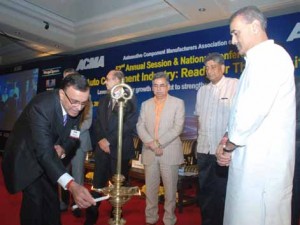 The Ministry of Heavy Industries & Public Enterprises is reviewing the targets set under the Automotive Mission Plan 2006-16. The conclusions drawn clearly indicate that the output of the automobile & auto component industry would reach $145 billion by 2016, accounting for more than 10 per cent of the country’s GDP and, in turn, generate employment for more than a million people.
The Ministry of Heavy Industries & Public Enterprises is reviewing the targets set under the Automotive Mission Plan 2006-16. The conclusions drawn clearly indicate that the output of the automobile & auto component industry would reach $145 billion by 2016, accounting for more than 10 per cent of the country’s GDP and, in turn, generate employment for more than a million people.

Inaugurating the 52nd Annual Session of the Automotive Component Manufactures Association of India (ACMA) with its theme on ‘The Transition of Auto Component Industry in India to the Next Level’, Mr. Praful Patel, Union Minister of Heavy Industries & Public Enterprises, suggested that to be globally competitive, it is essential for the Indian auto component industry to move up the value chain and to innovate and invest in product and process development through meaningful R&D.
He also stressed the need for the auto component industry to consistently work towards creating capacity ahead of demand, and in turn decreasing the cost of imports. It should focus on improving export prospects through bilateral routes and regional FTAs and also should focus on adequate talent creation, retention and skilling.
In his address, Mr. Arvind Kapur, ACMA President, and Managing Director, Rico Auto Industries Ltd., said: “There is a symbiotic connect between the growth of the automobile & auto component industry and the economy.
The economy is experiencing not just an ordinary slowdown but a sharp downturn in investment cycle, domestic policy paralysis and uncertain trade environment.
However, one must not forget that underpenetrated markets and the unfulfilled mobility aspiration of the people of India are the silver lining that gives us the confidence of a steady growth trajectory.”
To be globally competitive, the industry relationship with customers must transcend from being transactional to a mutually beneficial one. Neither build-to-print nor operational excellence is enough to be globally competitive. “We have to partner with the OEMs in design, development and testing and build affordable, innovative solutions”, he added.
The annual session which was attended by industry leaders like Mr. Pawan Munjal, Managing Director & CEO, Hero MotoCorp., Mr. Adi Godrej, CII President, and Chairman, Godrej Group, and Mr. S. Sundareshan, Secretary, Ministry of Heavy Industries, focused on the need for looking beyond conventional manufacturing, and called for paying due attention to diversifying into adjacent industries as well as innovation and R&D. It also noted with a sense of pride that the Indian auto component industry has wintessed robust growth at 15 per cent over the last five years. It must further scale up to get into the next orbit of growth and relevance.
The session also witnessed the launch of two studies by Mr. Praful Patel. The joint ACMA-McKinsey study on ‘Leveraging Superior Growth Foresight to Strengthen Company Competitiveness’ revealed that while the Indian auto components growth story is going to stay intact in the near future, the industry cannot afford to rest on its laurels. It elucidated essentials on where the growth and value creation are likely to migrate and how the Indian component industry can build a global footprint and assimilate capabilities through targeted acquisitions. It also elaborated on the need and the path to be taken by the auto component industry to grow into adjacent markets such as defence offsets, railways, etc., by leveraging their core competency.
To support India’s emergence as a global product development hub, it is also essential that Indian component manufacturers build progressive R&D capabilities and that a supportive eco-system for capacity and capability development be created, according to the joint ACMA-Ernst & Young study on ‘Growing beyond Manufacturing: India as an Emerging Auto Product Development Hub’. The study illustrated the trends in product development and the way forward for the automotive component manufacturers in India to move up the value chain through collaborative R&D.
ACMA’s Suppliers Portal, a joint initiative of ACMA and the OEMs, was also formally launched at the session. The portal showcases details of various Tier 2 & Tier 3 auto component suppliers, thus providing them with the opportunity to connect better with the OEMs’ & Tier I players. ACMA non-member companies also can post their details on the portal free of charge.
The ACT Website inaugurated during the annual session is a repository of various cluster programs, and training programs on Lean, Six Sigma and Production Management. A company can assess its production capabilities by running a simple diagnostic test on the website. The portal also showcases case studies of companies that can be referred by member-companies for benchmarking innovative manufacturing practices.
